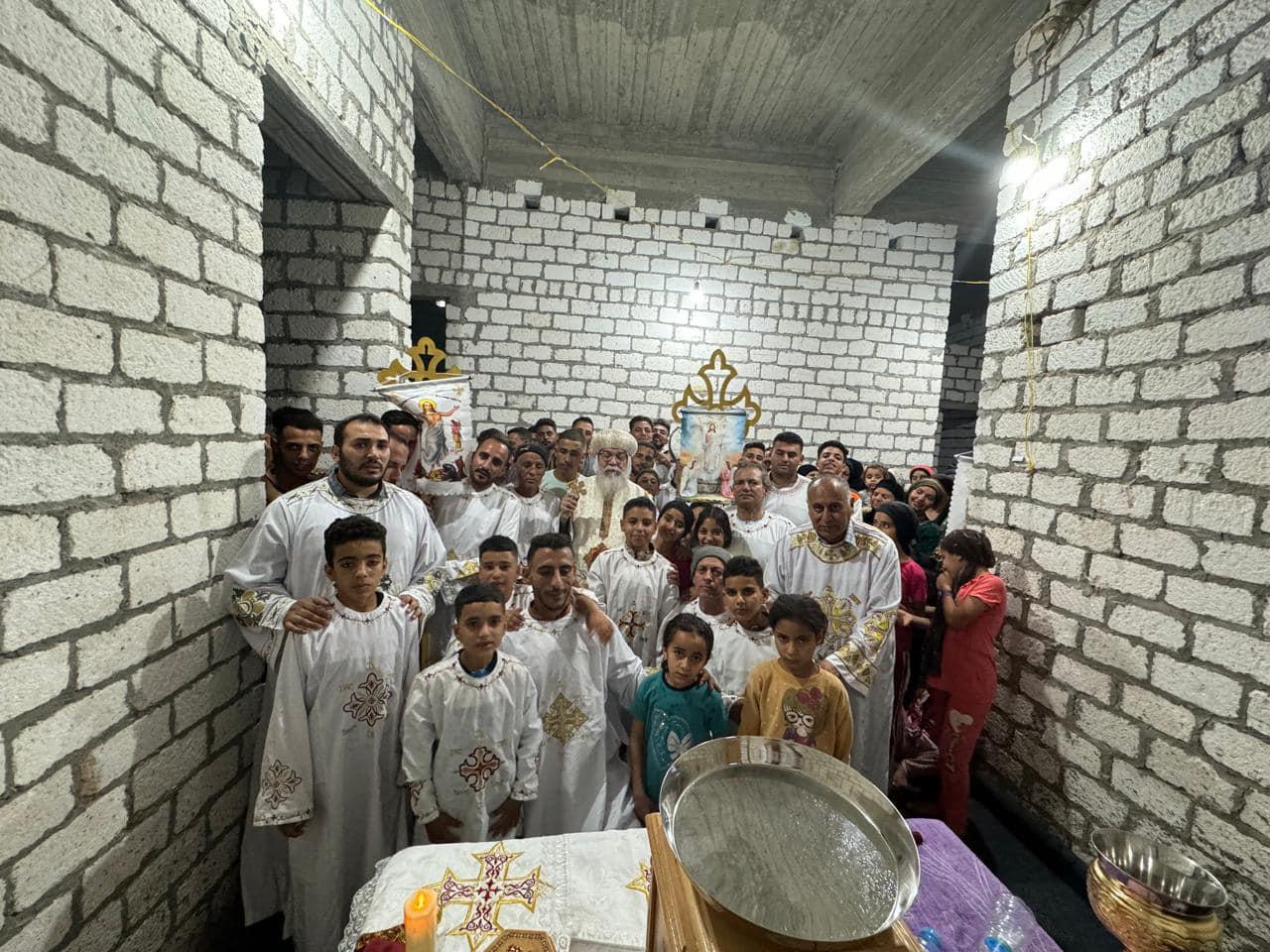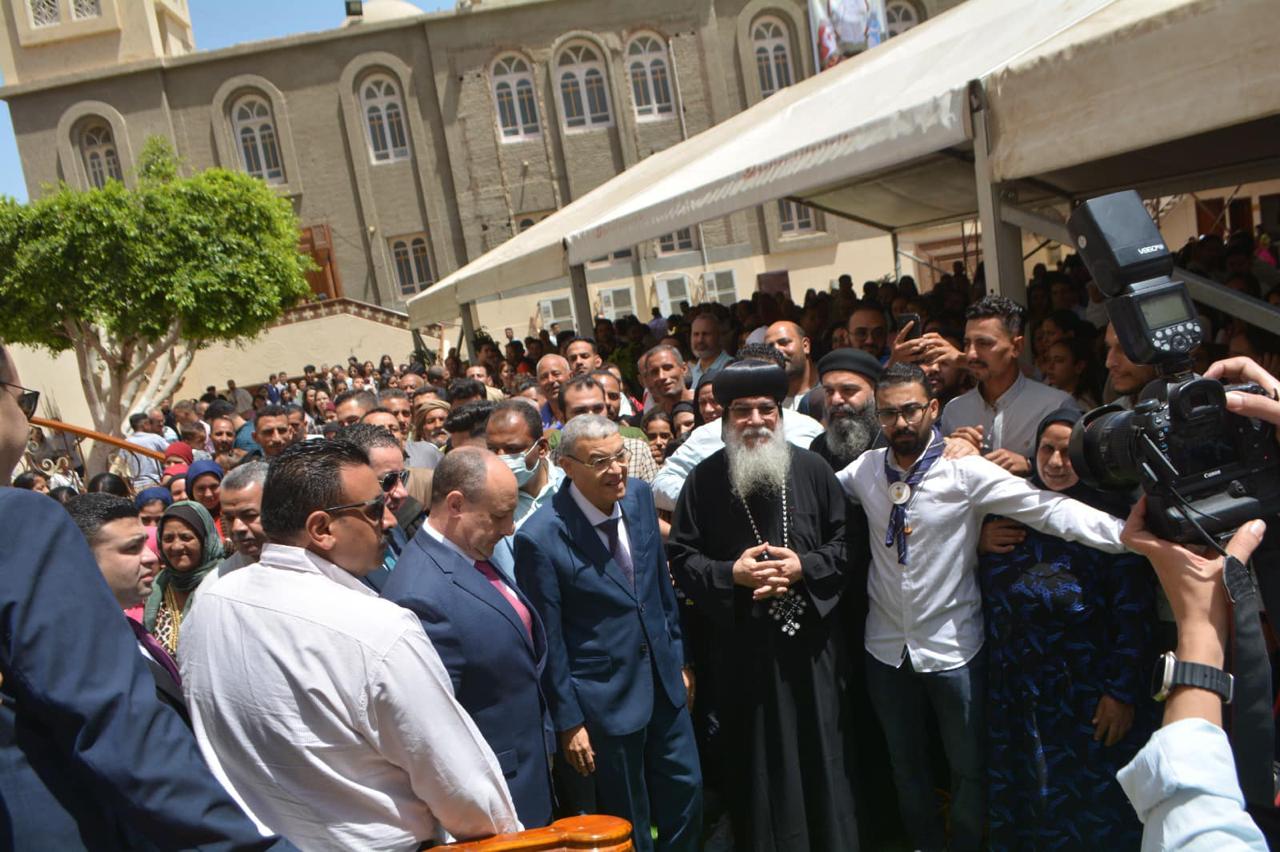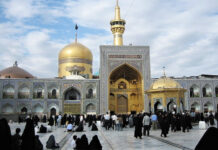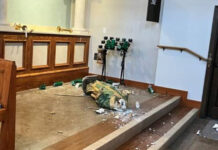By Nader Shukry —

The perpetrators and instigators of recent attacks against Copts in two villages in Minya, some 250km south of Cairo, have been referred to the Supreme State Security Prosecution in Cairo. They were charged with rioting, damage of property, use of firearms, burning property belonging to Copts, instigating terror, and disrupting public opinion.
The defendants had been detained based on evidence of surveillance camera footage and footage posted on social media by the perpetrators boasting of the fires they set up against Coptic-owned houses or shops.
The police are still in the process of searching for instigators and attackers who are on the run and have not been caught yet.
In the meantime, security forces have been heavily present at the Minya villages of al-Fawakher and al-Koum al-Ahmar. In the former, the violence against Copts had taken place on 23 April 2024 on account of a rumour that the Coptic villagers were attempting to build a church in the village which includes no church; in the latter the violence erupted on 26 April in retaliation to building a fully licensed Evangelical church.
Rumour of building church
Late on 23 April, on account of a rumour that al-Fawakher Copts intended to build a church in the village, fundamentalist Muslim villagers waged an attack against the Copts, setting fire to houses and property, hurling stones, and yelling angry cries against them. The attack continued amid the terror and screams of Coptic women and children, until the police arrived an hour later. According to a village Copt who spoke to Watani, it took the police that long to arrive because the village is on the western back of Minya, off the beaten track, with no paved roads leading to it.
On his X (previously Twitter) account, Anba Makarius, Bishop of Minya, posted: “I am following with great concern the extremists’ attack taking place now on the homes of the Copts in the village of al-Fawakher in Minya, burning a number of homes and preventing their residents from leaving. We have informed the relevant officials of the attack, and they have promised us to take all necessary action; we are confident of their prompt response.”
Once they arrived, the police contained the situation, cordoning off the village and its streets, and making sure there were no casualties. The firefighters put out the fires set by the assailants in Copts’ homes.
Minya Security Director and Deputy Governor of Minya hastened to the scene of events. The police arrested a number of the perpetrators and instigators, some of whom had used social media to rally for the attack.
Anba Makarius took to his X account to inform that, by the early hours of 24 April, calm had been restored in al-Fawakher. “Security forces have arrived and taken control of the situation,” he posted. “They arrested the instigators and perpetrators, and are tallying the damage inflicted. State authorities pledged they will compensate those affected by the damage, and will hold the perpetrators accountable.”
“Defending village against church”
According to Anba Makarius, al-Fawakher is a village of tribal character; part of the population is of Libyan tribal descent. It is home to 20,000 Muslims and more than 40 Coptic [extended] families. There is no church in the village, he said; it is served through a priest who occasionally visits and holds services in Coptic homes.
Anba Makarius said the instigation against Copts had started a few days before the attack. On 18 April, posts on social media railed against the village Copts for attempting to build a church, which was not true; and on 20 April, Molotov cocktails were hurled at three Coptic houses but caused no damage since they were swiftly contained. That same day, that director of the primary school in the village sarcastically insulted Coptic schoolgirls who were the attacked by their Muslim colleagues. When the Coptic parents complained, they were reprimanded and turned out by the school director.
On 23 April, Anba Makarius continued, fliers were distributed in the village calling for an attack against Copts for building a church in the village. “The village must be protected against the church”, the fliers rallied. The police were informed. That evening, at 10:30pm, the attack began.
Anba Makarius’s Easter Mass at al-Fawakher
In a surprise move that delighted the Copts of al-Fawakher, Anba Makarius visited the village on the Eve of the Feast of the Resurrection, where he presided over Midnight Mass at the house in which the Copts usually gather for prayer; Orthodox Easter was celebrated this year on 5 May.
The village was under tight security, so the Copts found it difficult to move to any other village to attend Mass. So the Bishop’s visit was for them cause of jubilation. Participating with him in Mass was Fr Theophilos Nabil who is in charge of the service in al-Fawakher.
In a goodwill gesture, the heads of the prominent Muslim families in the village met Anba Makarius, ensuring good relations among all the villagers.
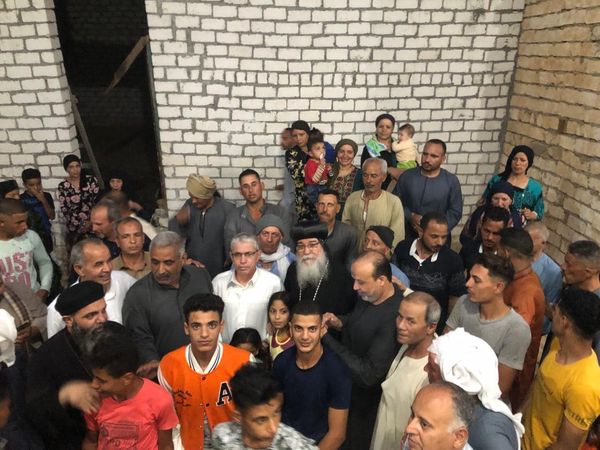
The following day, Easter Sunday, Anba Makarius invited representatives of the Coptic families in the village to accompany him to the diocese headquarters in Minya where they were able to meet Minya Governor Osama al-Qadi and senior security officials.
Following Friday prayers
As to the village of al-Koum al-Ahmar, the Evangelical Church had in October 2023 obtained licence to build a church. According to a villager who spoke to Watani, once the news was out, representatives of the biggest Muslim families in the village paid a visit to the Copts in charge to declare their rejection of building a church in the village. They cited the presence of a church already there, but the Evangelicals informed them that this was an Orthodox church in which they do not worship.
With full knowledge of the local security authorities, the Evangelicals started digging the foundation for the new church on 22 April. On Friday 26 April, following Muslim Friday noon prayers, a mob began hurling stones at Coptic houses. The police in the village confronted them but, being a small force, had to call for fortifications from Minya to contain the riots. Finally, calm was restored, and a number of the attackers caught.
The new church should serve some 2000 worshippers in al-Koum al-Ahmar. They have demanded that construction should not be stopped on security grounds but should resume, given that it is fully legal.
Rights
Rights activists and liberal politicians joined Anba Makarius in insisting that “security solutions” alone were inadequate to resolve fundamentalist attacks against Copts. True, such attacks have largely decreased in number through the last few years, but they remain smouldering in the ashes as long as extremist thought persists. Security solutions may do well in the short term, Anba Makarius expressed, but cannot work in the long term. “Persistent extremist thought must be weeded out,” the Bishop said. This would require efforts by religious authorities, as well as educational and media endeavours.
A prime sample is the primary school director at al-Fawakher who, Anba Makarius demanded, should be called into question and held accountable for instigating against his Coptic pupils. He also called upon the Awqaf Ministry, the official body responsible for Islamic endowments and the management of mosques, to investigate the role of mosques in perpetrating speech that leads to attacks against Copts.
Apology to Copts
In a recent development, representatives of the Muslim families of al-Koum al-Ahmar visited the pastor of the new Evangelical church, the construction of which had barely started, to offer apologies for the attack that occurred on 26 April.
The visit took place at a hall in the home of a member of the congregation; the hall was and is still used for holding prayer services in the absence of an Evangelical church.
The Muslim families said they rejected the violence directed at Copts, and gave pledges that such violent attacks would never occur again. They said that what took place recently was an exceptional occurrence initiated by a misguided few. “We are here to reach out to our Coptic brothers in peace, to reject and rectify what happened. We are all one. We call upon the security authorities to take the appropriate measures regarding those who were detained for perpetrating the violence against the Copts.” He concluded by wishing the Copts a Happy Easter (celebrated on 5 May 2024).
The pastor, Reverend Ragy gave a short word in which he said that he was confident that the violent attack was indeed an exceptional deed by the clans and tribes in the village. “We constantly offer our love and affection to all,” he said. “If sedition was sowed among the villagers, we believe it can be conquered by love. The Evangelical Church in this village serves all indiscriminately; we have for a long time joined in efforts to offer medical and social services.
“We call for peace in the village in order for us to live side by side with mutual love and respect.” Rev. Ragy thanked his guests for their initiative.
In reply to some who expressed fears that the peaceful initiative was a prelude to an out-of-court settlement in which Copts would lose their rights, representatives of the Copts denied that claim and insisted it was an initiative that aimed to restore peace and goodwill, but that the law must take its course. — Watani International


